Gaza
**At least 20 people have died from malnutrition and dehydration at the north’s Kamal Adwan and Shifa hospitals, according to the Health Ministry. Most of the dead are children — including ones as old as 15 — as well as a 72-year-old man.
**
Officials have been warning for months that Israel’s siege and offensive were pushing the Palestinians in Gaza into famine, the man-made famine has now killed vulnerable residents.
Hunger is most acute in northern Gaza, which has been isolated by Israeli forces and has suffered long cutoffs of food supplies.
Particularly vulnerable children are also beginning to succumb in the south, where access to aid is more regular.
At the Emirati Hospital in Rafah, 16 premature babies have died of malnutrition-related causes over the past five weeks, one of the senior doctors told The Associated Press.
“The child deaths we feared are here,” Adele Khodr, UNICEF’s Middle East chief, said in a statement earlier this week.
Israel’s bombardment and ground assaults have already killed an staggering number of children, who along with women make up nearly three-quarters of the more than 30,800 Palestinians killed, according to the Gaza Health Ministry.
Malnutrition is generally slow to bring death, striking children and the elderly first. Other factors can play a role. Underfed mothers have difficulty breastfeeding children. Diarrheal diseases, rampant in Gaza due to lack of clean water and sanitation, leave many unable to retain any of the calories they ingest, said Anuradha Narayan, a UNICEF child nutrition expert. Malnutrition weakens immune systems, sometimes leading to death from other diseases.
Israel largely shut off entry of food, water, medicine and other supplies after launching its assault on Gaza following Hamas’ Oct. 7 attack on southern Israel, in which militants killed some 1,200 people and took around 250 hostage. It has allowed only a trickle of aid trucks through two crossings in the south.
Israel has blamed the burgeoning hunger in Gaza on U.N. agencies, saying they fail to distribute supplies piling up at Gaza crossings. UNRWA, the largest U.N. agency in Gaza, says Israel restricts some goods and imposes cumbersome inspections that slow entry.
Also, distribution within Gaza has been crippled, U.N. officials say convoys are regularly turned back by Israeli forces, the military often refuses safe passage amid fighting, and aid is snatched off trucks by hungry Palestinians on route to drop-off points.
With alarm growing, Israel said this week it will open crossings for aid directly into northern Gaza and allow sea shipments.
One month after the International Court of Justice ordered “immediate and effective measures” to protect Palestinians in Gaza from the risk of genocide by ensuring sufficient humanitarian assistance and enabling basic services, NGO Amnesty International said Israel has failed to take bare minimum steps to comply.
Desperation, grief and horror
Conditions in the north, largely under Israeli control for months, have become desperate. Entire districts of Gaza City and surrounding areas have been reduced to rubble by Israeli forces. Still, hundreds of thousands of Palestinians remain.
Meat, milk, vegetables and fruit are nearly impossible to find, according to several residents who spoke to the AP. The few items in shops are random and sold at hugely inflated prices — mainly nuts, snacks and spices. People have taken barrels of chocolate from bakeries and are selling tiny smears of it.
Most people eat a weed that crops up in empty lots, known as “khubaiza.” Fatima Shaheen, a 70-year-old who lives with her two sons and their children in northern Gaza, said boiled khubaiza is her main meal, and her family has also ground up food meant for rabbits to use as flour.
“We are dying for a piece of bread,” Shaheen said.
Qamar Ahmed said his 18-month-old daughter, Mira, eats mostly boiled weeds. “There is no food that suits her age,” said Ahmed, a researcher with Euro-Med Human Rights Monitor and an economic journalist. His 70-year-old father gives his own food to Ahmed’s young son, Oleyan. “We try to make him eat and he refuses,” Ahmed said of his father.
Mahmoud Shalaby, who lives in the Jabaliya refugee camp, said he saw a man in the market give a bag of potato chips to his two sons and tell them to make it last for breakfast and lunch. “Everyone know I has lost weight,” said Shalaby, the senior program manager for the aid group Medical Aid for Palestinians in northern Gaza.
Dr. Husam Abu Safiya, the acting head of Kamal Adwan Hospital, told the AP his staff currently treats 300 to 400 children a day, and that 75% of them are suffering from malnutrition.
Recent airdrops of aid by Egypt and other countries provide far lower amounts of aid than truck deliveries, which have become rare and sometimes dangerous.
UNRWA says Israeli authorities haven’t allowed it to deliver supplies to the north since Jan. 23. The World Food Organization, which had paused deliveries because of safety concerns, said the military forced its first convoy to the north in two weeks to turn back Tuesday (Mar. 5).
When the Israeli military supervised a food delivery to Gaza City last week, troops guarding the convoy opened fire — on a perceived threat, the military says — as thousands of hungry Palestinians mobbed the trucks. Some 120 people were killed in the shooting, as well as by being trampled in the chaos.
The ordeal of the sick
Yazan al-Kafarna, 10, died Monday (Mar. 4) after almost a week of unsuccessful treatment in Gaza’s southernmost city of Rafah. Photos of the boy showed him extremely emaciated, with twig-like limbs and deep-sunk eyes in a face shriveled to his skull.
Al-Kafarna was born with cerebral palsy, a neurological condition that affects motor skills and can make swallowing and eating difficult. His parents said they struggled to find food he could eat, including soft fruits and eggs, since fleeing their home in the north.
He died due to extreme muscle wastage caused primarily by lack of food, according to Dr. Jabr al-Shair, head of the children’s emergency department at Abu Youssef Najjar Hospital.
On a recent day, around 80 malnourished children crowded the hospital's wards. Aya al-Fayoume, a 19-year-old mother displaced to Rafah, had brought her 3-month-old daughter, Nisreen, who has lost vast amounts of weight over the winter months, sick with persistent diarrhea and vomiting. On her diet of mainly canned goods, al-Fayoume said she doesn’t produce enough breast milk for Nisreen.
“Everything I need is expensive or unavailable,” she said.
Fresh food supplies in Rafah have dwindled, while its population has swelled to more than 1 million with displaced residents. The main thing available are canned goods, often found in aid packages.
At Emirati Hospital, Dr. Ahmed al-Shair, deputy head of the nursery unit, said the recent deaths of premature babies was rooted in malnutrition among mothers. Malnourishment and extreme stress are both factors causing premature, underweight births, and doctors say anecdotally cases have risen during the war, though the U.N. does not have statistics.
Al-Shair said premature babies are treated for several days to improve their weight. But then they are released home, which is often a tent with not enough heat, with mothers too malnourished to breastfeed and milk difficult to obtain. Parents sometimes give newborns plain water instead, which is often unclean, causing diarrhea.
Within days, the babies “are brought back to us in a terrible state. Some were brought already dead,” al-Shair said. He said 14 babies at the hospital died in February and two more so far in March.
Currently, the hospital’s wards have 44 babies under 10 days old with weights as low as 2 kilograms (4 pounds), some on life support. Every incubator has at least three premature babies in it, raising the risk of infection. Al-Shair said he fears some will meet the same fate when returned home.
“We treat them now but God knows what the future will be,” he said.



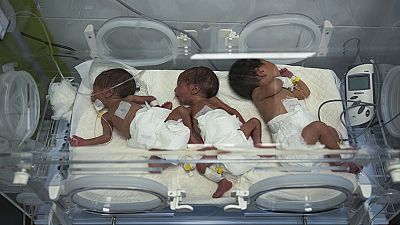


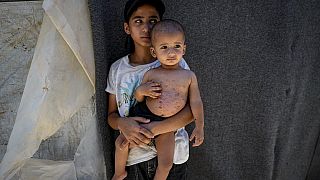
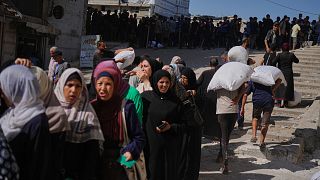
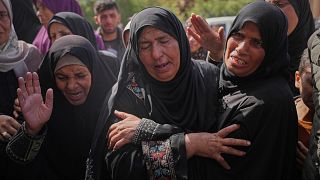
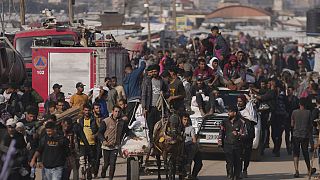



01:30
Trump calls for a Gaza ceasefire deal as some Palestinians are skeptical
01:03
Iran’s judiciary says at least 71 killed in Israel’s attack on Tehran prison
01:15
Egypt condemns Israeli 'aggression' against Iran, backs ceasefire
00:58
Iran: Hundreds of thousands mourn top military figures, civilians killed by Israel
01:39
Driven to starvation, Sudanese eat weeds and plants to survive
01:30
Israeli military says seven soldiers killed during operations in Gaza